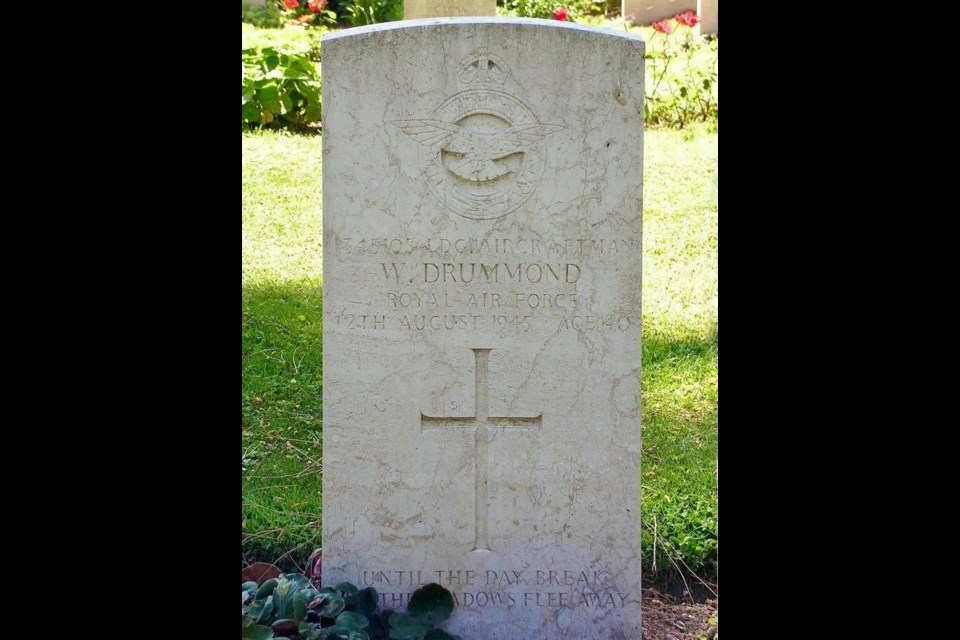Veteran Bill Drummond may have lived in Canada for the past 50 years, but he still retains a large portion of the thick Scottish accent he grew up with in Clackmannshire.
Drummond served in the British Army's Royal Military Police in peace time between 1959 and 1965, but his reasons for joining up go back 14 years before that when his dad William Drummond Sr. died in the Second World War.
“When it came to the Second World War, my father and his brothers were all exempt because they were needed at home,” said Drummond. “They were involved in food production. My father actually said, ‘Somebody has got to go to fight.’ So he volunteered.”
Bill Sr. had been partly inspired to join thanks to the example of his brother-in-law, Henry Pert, who, as a member of the famous Argyll and Sutherland Highlanders, was told to stand with his regiment as the last line of defence at Dunkirk to ensure all other British soldiers caught in that Nazi trap were able to evacuate safely. That last stand by the Highlanders and others in those dark days turned certain destruction into a fighting chance for survival for the countless British soldiers who did end up making it back across the Channel to fight another day.
“They told him: ‘You’re not going home. You are fighting to the last man and last bullet,’” Drummond recalled.
His uncle would spend six years in a German prisoner of war camp. So it was no wonder, given this potent example, that Bill Sr. chose to join up despite being no spring chicken, already in his late thirties in 1939.
“He was very much the grandfather of the squad,” explained Drummond. “I have a picture of the whole squad. There are 134 men, and he is by far and away the oldest.”
Bill Sr. would join the Royal Air Force and serve as ground crew in air traffic control.
“My dad had told my mom that he was in the control tower, and this bomber came across, and it wasn’t going to make it,” recalled Drummond. “So he circled around, and my dad said everybody hit the floor because they figured he was going to take the tower topper off.”
Drummond would be born in 1941, but he admits one of the biggest sadnesses of his life is he never really knew his father.
“When I was born, he was virtually already overseas,” said Drummond. “The only way I can describe it is I am very proud. My dad and his brothers didn’t have to go, but he said, ‘No, somebody has got to go. We have got to fight these people. We have to beat these people.’ But honestly, it was tough to live with for a lot of years.”
His father would die tragically in 1945 just as the war was coming to an end.
“He was stationed at the time in Italy in Naples,” explained Drummond. “They said to him, ‘You are going home.’ The war is over, but you’ve got to go to Rome to get the plane to go home … He was killed on the highway between Naples and Rome. Six years in the war, and he gets killed in a traffic accident on his way home.”
His father’s death was hard on the family in many ways. Drummond recalled his mother was now a war widow living on a small survivor’s pension, and trying to make ends meet with a low-paying job at a bakery, while she had two young children to feed, clothe, house and school.
“Quite honestly, we were poor,” said Drummond. “That is the only way to describe it. She got a (survivor’s pension), but it was a joke.”
At the age of 18, Drummond himself would join the military to try to make a little money and train for a career in policing after his military service. In the backdrop of his time as a military policeman, which mostly involved convoy duties, base security duties and breaking up rowdy fights at pubs among soldiers, was the ever-present fear of the Cold War, (which briefly went hot during the Cuban Missile Crisis), and the domestic threat of the Irish Troubles.
While proud of his service, Drummond realized that a career in policing beyond the military would not be for him. Instead he managed entertainment venues back home for a few years, and briefly undertook an apprenticeship in house painting and decorating before moving to Swift Current in Canada in 1974 to “provide a better future” for his children. He moved to Airdrie in 2003.
“I served my queen,” said Drummond. “I served my country. I honoured my family tradition and the memory of my father. Quite a lot of the stuff that was taught me in the army, sticks with me to this day.”
As for his time as a military policeman, Drummond said he has no regrets on that score either.
“It’s like civilian police,” he said. “You don’t want to know them until you need them … We put our lives on the line every day for you.”
Bill Drummond continues to serve as 1st Vice-President of the Airdrie Legion Branch.



